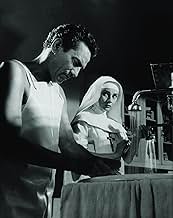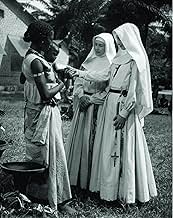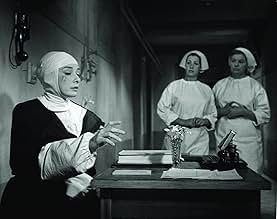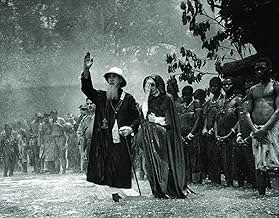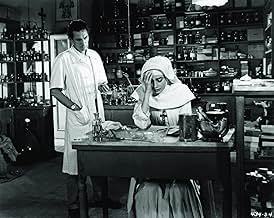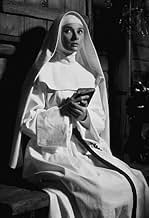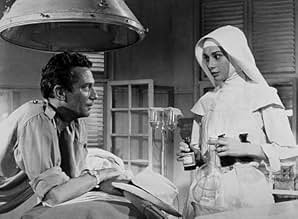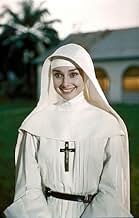Dopo aver lasciato una ricca famiglia belga per diventare suora, suor Luke, lotta con la sua devozione ai suoi voti durante la crisi, la delusione e la seconda guerra mondiale.Dopo aver lasciato una ricca famiglia belga per diventare suora, suor Luke, lotta con la sua devozione ai suoi voti durante la crisi, la delusione e la seconda guerra mondiale.Dopo aver lasciato una ricca famiglia belga per diventare suora, suor Luke, lotta con la sua devozione ai suoi voti durante la crisi, la delusione e la seconda guerra mondiale.
- Regia
- Sceneggiatura
- Star
- Candidato a 8 Oscar
- 11 vittorie e 23 candidature totali
- Rev. Mother Emmanuel (Belgium)
- (as Dame Edith Evans)
- Mother Mathilde (Africa)
- (as Dame Peggy Ashcroft)
Recensioni in evidenza
Gabrielle van der Mal enters a convent in Belgium with the lukewarm approval of her surgeon dad. She is a trained nurse and has a heart for nursing, specifically in the Congo, which was a colony of Belgium's at the time. The film follows her through her first year and a half in the convent until she takes her final vows, the trials and tribulations she faces there, and her delay in finally being assigned to the Congo as a nurse.
This is a great film that doubles as a good documentary on what is involved in becoming a nun, so much so that I'd say that Gabrielle really didn't so much want to be a nun as she figured this was the only path to getting to serve in the Congo as a nurse - a primitive place with a great need for medical professionals of all kinds.
When Gabrielle finally does get to the Congo and has served as OR nurse to the agnostic Dr. Fortunati, she is panicked when the day comes that she is ordered to return to Belgium. Gabrielle isn't so much someone who sees herself as a rebel within the church - this is the tradition that she grew up in and she seems fine with it - as much as she sees everyday life in the convent as boring and tiresome, especially after several years of being a nurse in the Congo and being so very helpful.
Neither does she have a huge problem with forgiveness. In Africa a native beats another nun to death for no other reason than a witch doctor told the man that if he killed a white woman that the ghost of his dead wife would stop haunting him. In spite of the pointlessness of the murder, in spite of the fact that she knew the murdered nun, Gabrielle has sympathy and forgiveness in her heart for the killer. But then she returns to Europe and the Nazis invade and quickly take over Belgium. When they kill her father while he is tending to some refugees, Gabrielle realizes her heart is not big enough to forgive such systemic cruelty. At that point she must make a choice.
This film is based upon a novel written by Kathryn Hulme, the partner of Gabrielle van der Mal for over thirty years, until Hulme's death in 1981. Perhaps it was because the author was so close to Gabrielle that the main character is so well examined.
Audrey Hepburn is Gabrielle van der Mal, a young Belgian woman who commits her life to Christ and becomes Sister Luke. Hepburn was proud of this film and justifiably so. Her portrayal (based on a true story) is riveting and authentic. The entire cast is excellent. Peter Finch plays Dr. Fortunati, a physician who challenges Sister Luke with his outspoken nature and his disregard for convention.
The narrative goes well beyond Sister Luke's struggle with her vows of poverty, chastity and obedience. It is a coming of age story and a celebration of self-actualization. In the end, the viewer is left wanting more. Hepburn extracts the maximum emotional impact from each scene, and we know there is much more to this story beyond the final, haunting shot.
Anyone who has tried to live a perfect life, to please God and never offend Him with sins of any nature, knows it is impossible. It is a noble pursuit, but an exercise in futility that can lead to utter frustration. That is the dilemma we witness here in this film through the life of a well-meaning and sweet-as-can-be Belgian lady: "Gabrielle van der Mal" who is renamed "Sister Luke" after completing her training as a nun in the 1930s. Audrey Hepburn is superb as this woman, who has the greatest of spiritual intentions and a heart not only for God but to be a great nurse and follow in her father's footsteps, a famous physician in his country.
Can't she be both? The answer, of course, is "yes," but that's not the answer she receives periodically at the convent, or interprets because she's so tough on herself, and it causes great inner conflict.
Hepburn doesn't have tons of dialog in here and doesn't require it. The different looks on her face during this long story, especially when there is disappointment, are priceless. They are so subtle, but so telling. I am one who would vote for this film as Audrey's best performance, which is saying a lot.
anyone who thinks she was only a fashion model is well advised to see this film. I first saw it in a theatre, in 1959. I went in about five minutes before the end--and the theatre was completely sold out. At the end of the movie, no one moved--everyone remained seated for about thirty seconds. Then the audience got up and filed out--without a single sound. I stayed through to see the ending again. The audience behavior was the same. I have never seen an audience reaction like this.
Hepburn should have received an Oscar for this performance, as well as another for "Two for the Road," for which she wasn't even nominated. She has been sadly underrated and undervalued as an actress. Her high placement in many Best Actress Ever polls has been entirely justified and very pleasing.
Lo sapevi?
- QuizThe role of Sister Luke was suggested for Ingrid Bergman but Bergman herself said she was too old for the role and instead proposed Audrey Hepburn.
- BlooperWhen the patient in the Congo hospital is being attended by several people, the voice of the actor playing the patient is obviously dubbed over by actor Dean Jagger, who plays Sister Luke's father in the film.
- Citazioni
Sister Luke: You can cheat your sisters, but you cannot cheat yourself or God.
Rev. Mother Emmanuel: Have you struggled long enough to say surely that you've come to the end?
Sister Luke: I think I've been struggling all these years, Reverend Mother. In the beginning each struggle seemed different from the one before it. But then they began to repeat, and I saw they all had the same core: obedience. Without question, without inner murmuring. Perfect obedience as Christ practiced it. As I no longer can.
Rev. Mother Emmanuel: Yes?
Sister Luke: There are times when my conscience asks which has priority. It or the Holy Rule? When the bell calls me to chapel, I often have to sacrifice what might be the decisive moment in a spiritual talk with a patient. I'm late every day for chapel or refectory or both. When I have night duty I break the Grand Silence because I can no longer cut short a talk with a patient who seems to need me. Mother, why must God's helpers be struck dumb by five bells in the very hours when men in trouble want to talk about their souls?
- ConnessioniFeatured in Hey Dad..!: Testing Time (1990)
- Colonne sonoreVoi Che Sapete
from "The Marriage of Figaro"
Written by Wolfgang Amadeus Mozart (as W. A. Mozart)
Played by Gabi and her father on the piano, and recurring throughout the film's score.
I più visti
Dettagli
- Data di uscita
- Paese di origine
- Lingua
- Celebre anche come
- The Nun's Story
- Luoghi delle riprese
- Brugge, West-Vlaanderen, Belgio(Convent exteriors, other exteriors)
- Azienda produttrice
- Vedi altri crediti dell’azienda su IMDbPro
Botteghino
- Budget
- 3.500.000 USD (previsto)
- Tempo di esecuzione2 ore 29 minuti
- Colore
- Proporzioni
- 1.85 : 1
Contribuisci a questa pagina



